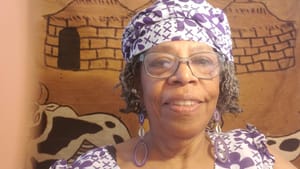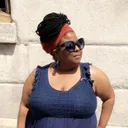Stay in the Loop
BSR publishes on a weekly schedule, with an email newsletter every Wednesday and Thursday morning. There’s no paywall, and subscribing is always free.
Sewing together affordable, accessible solutions
Creative menstrual hygiene with Maisha Ongoza and the PASHI project

Mixed media artist, educator, and community leader Maisha Ongoza had made it a habit to travel to various countries in Africa once or twice a year prior to the pandemic. On her visits, she frequently visited schools and brought supplies. One of the things she noticed was that girls would often attend classes with soiled uniforms. When she asked about it, she found that although school officials tried to help, the cost of even one loose sanitary napkin was prohibitively expensive. This was what set the path for the Pan-African Sisterhood Health Initiative, or PASHI, an intergenerational powerhouse and coalition that allows seasoned seamstresses to share their skills and their wisdom with middle and high school students. They meet on Wednesdays at Ujima Friends Peace Center, a community center for Black Quakers in North Philadelphia.
Health at the seams
Ongoza knew these girls needed and deserved a more sustainable solution, so when she returned to Philadelphia, she reached out to her fellow artists in the Sankofa Artisans Guild who work with textiles, among other things. After some research, they decided to create reusable pads, which are not only more thrifty than their disposable counterparts but, unlike drugstore-bought pads, they are free from the forever chemicals that have been linked to myriad serious illnesses.
Once they got started, it grew exponentially and soon became PASHI. “This project is a blessing to us because we’ve formed a tight circle of friends now,” Ongoza says. “And we’re teaching life skills because schools don’t have sewing anymore. These children love being with us. There’s never a device out; they’re so engaged and love making things.”
Their latest shipment was to Madagascar, and their biggest shipment was 500 pads to Cuba. The need is high all over the world, but Ongoza wants to be precise about the language.
“They call it period poverty; that’s the popular name for it. We don’t call it that. If they can’t afford menstrual products, they most likely can’t afford much of anything. They’re impoverished about everything except for their spirit.” Ongoza instead refers to this particular lack as a “menstrual hygiene management problem.” She mentioned that young girls right here in the United States might construct makeshift pads out of socks and toilet paper.
Another initiative that PASHI has is its safe birthing kits. They partner with the group Birthing International, which provides sterile medical-grade supplies for medical centers and individuals who need them. PASHI constructs the pouches for the kits from leftover fabric and fabric donations unsuitable for constructing pads (they only use specially constructed absorbent cotton for the pads).
The massive impact of PASHI has not gone unnoticed. For the past few months, members of the group have been fundraising and preparing to send a delegation of 10 members to the seventh annual Artizen Conference, an international gathering honoring the use of art for social transformation. The conference, which will meet in Zimbabwe this year, invited Ongoza to be a keynote speaker representing America. The group saw this as a huge opportunity to teach, learn, and create: they will not only be bringing hundreds of pads, but they will also be facilitating workshops showing school girls and other attendees how to make pads using local supplies.
Ongoza speaks with such matter-of-fact affection about this initiative that is changing lives all over the world. This helps prove that the beauty of art can be so much more than just aesthetic, but sustainable convention and function.
Sign up for our newsletter
All of the week's new articles, all in one place. Sign up for the free weekly BSR newsletters, and don't miss a conversation.

 Crystal Sparrow
Crystal Sparrow